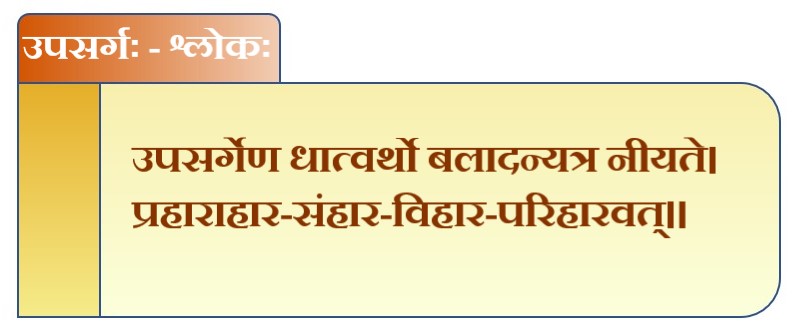 | We learn about........ | |
| We have so far learned in this module... |
| The goal of this lesson is to learn ….. |
|
The conversation video for this lesson contains sentences using द्वितीया-विभक्तिः. We also learn many sentences which we can freely use in conversation with our guests (Guest – अतिथिः). The words to be noted are highlighted in yellow color.
| Conversation Practice - सम्भाषणाभ्यासः | ||
|---|---|---|
| वयम् आरम्भे पूर्वतन पाठस्य किञ्चित् स्मरणं कुर्मः | ||
| अत्र बहूनि वस्तूनि सन्ति । | ||
| कृपया करदीपम्/उपनेत्रं ददातु । | ध्वनिमुद्रिका – Cassette सान्द्रमुद्रिका – CD ROM | |
| अहं तया सह कथं सम्भाषणं करोमि इति शृण्वन्तु । | ||
| गृहस्थः – अतिथिः - सम्भाषणम् | ||
| कुशलं वा ? माता कुशलिनी अस्ति वा ? कः विशेषः ? | आं कुशलम् । गृहे सर्वं कुशलम् । विशेषः कोऽपि नास्ति । | |
| पानीयं ददामि । | किञ्चित् शर्करा आवश्यकी ? | |
| सा विद्यालयं गतवती अस्ति । | पिता कार्यालयं गतवान् ? | |
| विस्मृतवान् । | अनुजस्य परीक्षा समाप्ता ? | |
| पानीयं किं स्वीकरोति ? | किमपि मास्तु । | |
| सङ्कोचः मास्तु । किञ्चित् स्वीकरोतु भोः । | किञ्चित् ददातु । | |
| किं ददामि ? अस्तु ददामि । | फलरसं ददातु । अन्यः विशेषः कः ? | |
| पुरतः, पृष्ठत, वामतः, दक्षिणतः, उपरि अधः | ||
| पार्श्वे कः अस्ति ? | ||
| हेमन्तः वरुणस्य पुरतः अस्ति । | दिलीपः वरुणस्य पृष्ठतः अस्ति । | |
| प्रिया मेघायाः पुरतः अस्ति । | अहल्या मेघायाः पृष्ठतः अस्ति । | |
| विजय, पुरतः आगच्छतु । | पृष्ठतः गच्छतु । | |
| माधुरी पुरतः उपविशति । | अर्चना पृष्ठतः उपविशति। | |
| प्रसन्नः मम दक्षिणतः अस्ति । | प्रिया मम वामतः अस्ति । | |
| आकाशः उपरि अस्ति । | भूमिः अधः अस्ति । | |
| उपकारिषु, अपकारिषु, साधुत्वे, दूरतः | ||
We saw in the lesson on special verb forms (विशेषक्रियापदानि) the verb forms प्राप्नोति, प्राप्नुतः, प्राप्नुवन्ति etc where the prefix प्र joins with the verb root आप्. Prefixes in Samskrit are known as उपसर्गाः (Plural form of उपसर्गः). Upasargas do not have meaning or function independently. But they affect the meaning of the dhatu in several ways. प्र + आप् emphasizes one of the meanings of आप्, ‘to get or to acquire’. उपसर्गाः enrich the language and are widely used in संस्कृतम्. The following Verse presents the role of उपसर्गाः beautifully.

The verse tells adding an Upasarga to a dhatu forcefully changes its meaning as in the case of प्रहार, आहार, संहार, विहार, परिहार, words formed using different Upasargas to root form हृ.
Let us now see how Upasargas affects the meaning of the verb form ‘हरति’ which gives the sense of taking or snatching away.
| उपसर्गः | क्रियापदम् | उपसर्गयुक्तक्रियापदम् |
|---|---|---|
| परि | हरति Takes away | परिहरति (Solves) |
| वि | विहरति ( Roams) | |
| आ | आहरति ( Brings) | |
| प्र | प्रहरति ( Beats) | |
| सम् | संहरति ( Kills) | |
| उप + सम् | उपसंहरति (Concludes) | |
| उत् + आ | उदाहरति (Gives an example, ) |
We learn in this lesson the number of Upasargas and some of their functions and rules followed when an Upasarga is added to a dhatu.
In Samskrit there are 22 Upasargas which are listed below. They are technically called ‘प्रादयः’meaning the group of prefixes starting with प्र.
| प्र | प्रा | अप् | सम् | अनु | |
| अव | निस् | निर् | दुस् | दुर् | |
| वि | आ | नि | अधि | अपि | |
| अति | सु | उत् | अभि | प्रति | |
| परि | उप | ||||
Upsargas when joined always precedes the verb root.
उपसर्गः धातोः पूर्वं भवति ।
Upasargas functions principally in three ways. The following sloka depicts this beautifully.

उपसर्गाः function in three ways. Prefixes sometimes change the meanings of the roots; Sometimes follow the original meanings; Sometimes enhance their meanings.
Let us understand these functions with some examples.
Prefixes sometimes change the meanings of the roots.
उपसर्गः कदाचित् धातोः अर्थं परिवर्तते ।
| धातुः | क्रियापदम् | उपसर्गसहितक्रियापदम् |
|---|---|---|
| स्मृ | स्मरति Remembers | वि + स्मरति = विस्मरति Forgets |
| गम् | गच्छति Goes | आ + गच्छति = आगच्छति Comes |
Prefixes sometimes support the meaning of the dhatu.
उपसर्गः कदाचित् धातोः अर्थं समर्थयति ।
| धातुः | क्रियापदम् | उपसर्गसहितक्रियापदम् |
|---|---|---|
| विश् | विशति Enters |
प्र + विशति = प्रविशति Enters |
| वृत् | वर्तते Is there, happens |
प्र + वर्तते = प्रवर्तते Is there, happens |
Prefixes sometimes enhance the meaning of the dhatu.
उपसर्गः कदाचित् धातोः अर्थं पोषयति ।
| धातुः | क्रियापदम् | उपसर्गसहितक्रियापदम् |
|---|---|---|
| लिख् | लिखति Writes | वि + लिखति = विलिखति Writes well. |
| शुभ् | शोभते Shines, appears beautiful | सु + शोभते = सुशोभते Shines well, appears perfectly beautiful. |
Sometimes Prefixes express the meaning of the dhatu in a different way.
उपसर्गः कदाचित् धातोः अर्थं किञ्चित् विस्तारयति ।
| धातुः | क्रियापदम् | उपसर्गसहितक्रियापदम् |
|---|---|---|
| गम् | गच्छति Goes | अनु + गच्छति = अनुगच्छति Follows |
| ईक्ष् | इक्षते Looks at | परि + ईक्षते = परीक्षते Tests, checks |
In addition to the above functions two more features of Upsargas are to be noted.
Often two are three Upasargas join the verb root to give a new verb form.
प्रति + आ + गच्छति = प्रत्यागच्छति (Returns)
सम् + अति + गच्छति = समतिगच्छति (Goes towards, surpasses)
सम् + उत् + आ + हरति = समुदाहरति (Expresses well)
Some times upasargas alter the पद of the verb to which they are added. That is Atmanepadi form is changed to Parasmeipadi form and other way as well.
| उपसर्गः | परस्मैपदी-क्रियारूपम् | उपसर्गयुक्त-आत्मनेपदी- क्रियारूपम् |
|---|---|---|
| सम, अव, प्र, वि | तिष्ठति (धातुः स्था) | समतिष्ठते अवतिष्ठते प्रतिष्ठते वितिष्ठते |
| सम् | गच्छति (गम्) | समगच्छते |
| वि, परा | जयति (जि) | विजयते पराजयतौ |
| वि | क्रीणाति (क्री) | विक्रीणीते |
| उपसर्गः | आत्मनेपदी-क्रियारूपम् | उपसर्गयुक्त-परस्मैपदी- क्रियारूपम् |
|---|---|---|
| वि, आ, परि | रमते (रम्) | विरमति आरमति परिरमति |
अलम् + करोति = अलङ्करोति (Beautufies)
बहिस् + करोति = बहिष्करोति (Discards)
अन्तर् + भवति = अन्तर्भवति (Included in)
स्वी + करोति = स्वीकरोति (Takes, accepts)
उष्णी + करोति = उष्णीकरोति (Heats)
सज्जी + करोति = सज्जीकरोति (Getting ready, dressing up)
We first give a list of verbforms with prefixes. This also helps you to recollect some of the verb forms we learned earlier. The English meanings of the क्रियापदानि are given for you to compare and understand.
| उपसर्गः | धातुः | क्रियापदम् | उपसर्गसहितक्रियापदम् |
|---|---|---|---|
| आ | गम् | गच्छति (Goes) | आगच्छति (Comes) |
| नी | नयति (Draws, Takes) | आनयति (Brings) | |
| अधि | वस् | वसति (Dwells) | अधिवसति (Dwells) |
| अनु | वद् | वदति (Tells) | अनुवदति (Repeats) |
| धा | धावति (Runs) | अनुधावति (Runs after, Chases) | |
| कृ | करोति (Does) | अनुकरोति (Follows in doing) | |
| अप | कृ | करोति (Does) | अपकरोति (Takes away) |
| अभि | ज्ञा | जानाति (Knows) | अभिजानाति (Be aware of ) |
| अव | गम् | गच्छति (Goes) | अवगच्छति (Understands) |
| नम | नमति (bows in prayer) | अवनमति (bows) | |
| उत् | पत् | पतति (Falls) | उत्पतति (Jumps) |
| स्था | तिष्ठति (Stands) | उत्तिष्ठति (Gets up) | |
| उप | कृ | करोति (Does) | उपकरोति (Helps) |
| नि | क्षिप् | क्षिपति (Throws) | निक्षिपति (Deposits, Invests) |
| परा | भू | भवति (To be) | पराभवति (Defeats/Gets defeated) |
| परि | पाल | पालयति (Cares) | परिपालयति (Protects) |
| पृच्छ | पृच्छति (Asks) | परिपृच्छति (Asks in detail) | |
| प्र | नम् | नमति (Bows in Prayer) | प्रणमति (Makes Obeisance) |
| हृ | हरति (Takes away) | प्रहरति (Beats) | |
| क्षाल् | क्षालयति (Cleans) | प्रक्षालयति (Cleans thoroughly) | |
| वि | लिख् | लिखति (Writes) | विलिखति (Writes well) |
| हृ | हरति (Takes away) | विहरति (Roams ) | |
| स्मृ | स्मरति ((Remembers) | विस्मरति (Forgets) | |
| सम् | ग्रह | गृह्णाति (Holds) | सङ्गृह्णाति (Holds together) |
| हृ | हरति (Takes away) | संहरति (Kills) |
The following table lists all the उपसर्गाः along with the sense they add or bring in to the original verb. Example sentences clarify the sense of the उपसर्गाः.
| उपसर्गः | सूचितः अर्थः | वाक्ये प्रयोगः |
|---|---|---|
| प्र | More, Forward | गङ्गा हिमालयात् प्रभवति । Ganges originates from (in) Himalayas. |
| परा | Down, Backward | विद्वान् मूढं पराभवति । Learned man defeats the fool. |
| अप | Near, to ; Away, Separation | चोरः स्यूतम् अपहरति । Thief snatches the bag. |
| सम् | Near, to , Away, Separation | छात्राः सङ्गच्छन्ति । Students go together. |
| अनु | Behind | सीता रामम् अनुगच्छति । Seetha follows Rama. |
| अव | Down | अहं पाठम् अवगच्छामि । I understand the lesson. |
| निस् | Out, Far away, Without | सर्पः बिलात् निस्सरति । Snake comes out of the hole. |
| निर् | Out | सः गृहात् निर्गच्छति । He leaves the house. |
| दुस् | Bad, Wicked | धनस्य दुष्प्रयोजनं मा करोतु । Do not misuse money. |
| दुर् | Difficult | धर्मश्रेष्टाः दुर्लभाः । Virtuous people are rare. |
| वि | Contrary, Particular | धर्मः एव विजयते । Righteousness alone wins. |
| आ | To, From, Upto, Backwards | सर्वे तत्र आगच्छन् । All came there. |
| नि | In, More | वृक्षेभ्यः पत्राणि निपतन्ति । Leaves fall from trees. |
| अधि | Above | पुस्तकम् उत्पीठिकाम् अधिवसति । Book lies on the table. |
| अति | Beyond | अत्याचारं मा करोतु । Do not be atrocious. |
| अपि | Also, To cover | वर्षकाले नदी तटे अपिसरति । River covers its banks during rainy season. |
| सु | Good | उद्याने पुष्पाणि सुशोभन्ते । Flowers are delightful in the garden. |
| अभि | Towards | अध्यापकः विद्यालयम् अभिगच्छति । Teacher goes towards the School. |
| प्रति | Towards, Against | पुत्री मातरं प्रतिवदति । Daughter answers the mother. |
| परि | Around | आचार्यः शिष्यं परीक्षते । Teacher tests the ward. |
| उप | Near, To | सर्वे मन्दिरम् उपगच्छन्ति । All approach the temple. |
| उद् | Up | अङ्गुरः भूमेः उद्गच्छति । Sapling rises from the earth. |
किञ्चित् अभ्यासं कृत्वा पाठं समापयाम । Let us complete the lesson by doing some practice on what we have learned.
प्रतिष्ठते - प्रथम-पुरुषः एकवचनम् आत्मनेपदरूपम्
प्रतिष्ठते प्रतिष्ठेते प्रतिष्ठन्ते
प्रतिष्ठसे प्रतिष्ठेथे प्रतिष्चध्वे
प्रतिष्ठे प्रतिष्ठावहे प्रतिष्ठामहे
We welcome your views and suggestions on this lesson. Please post your comments and replies after registering. Please also send a mail to samskrit@samskritaveethy.com for any clarification on the lesson.
We have so far learned....
We are now conversant with Upasargas and present tense verb forms. We also observed noun forms are formed by joining suffixes (प्रत्ययाः) to verbs. Some noun forms so formed indicate actions done in the past. We learn about one such noun forms in our next lesson. Our next lesson is….
Lesson 12: Sanskrit Past Participle - क्तवतु प्रयोगः
 | 0 comments |
To get updates on
संस्कृतवीथी...